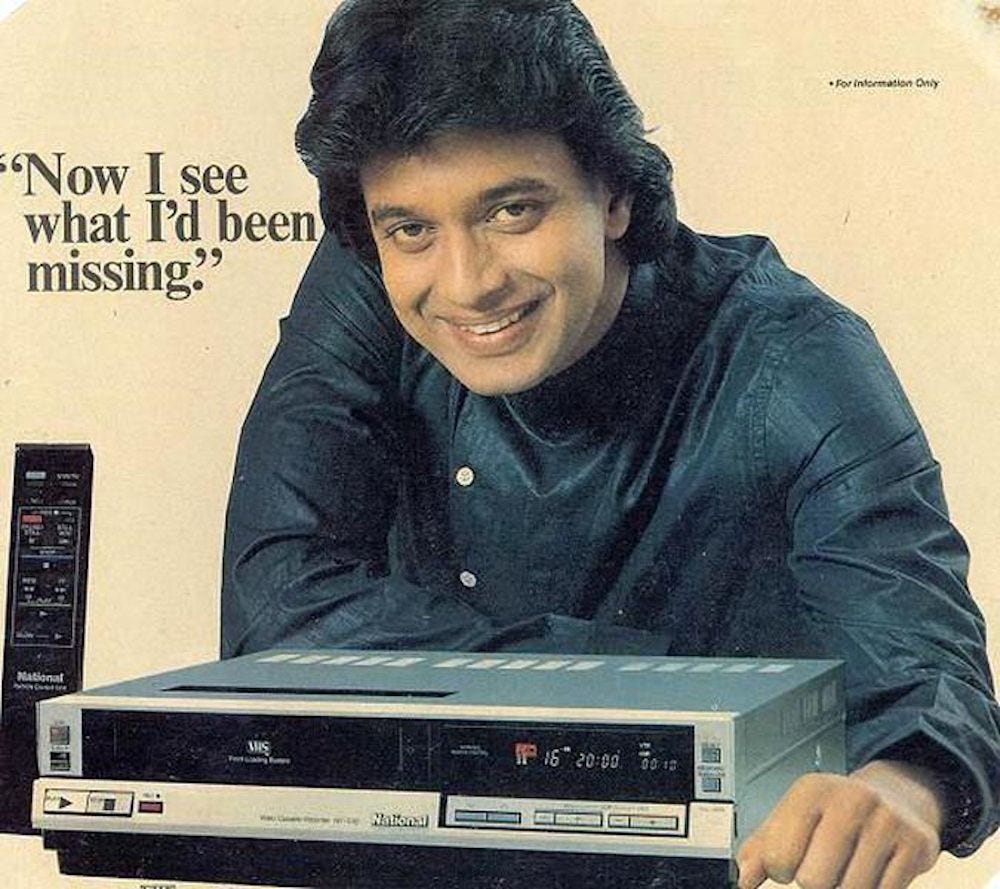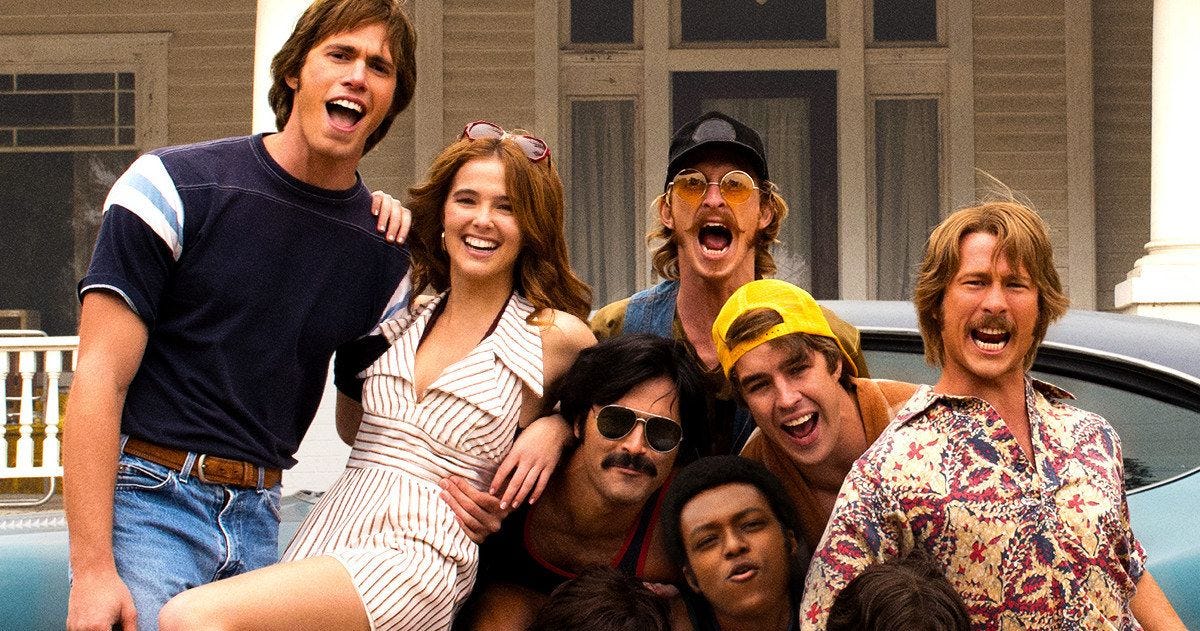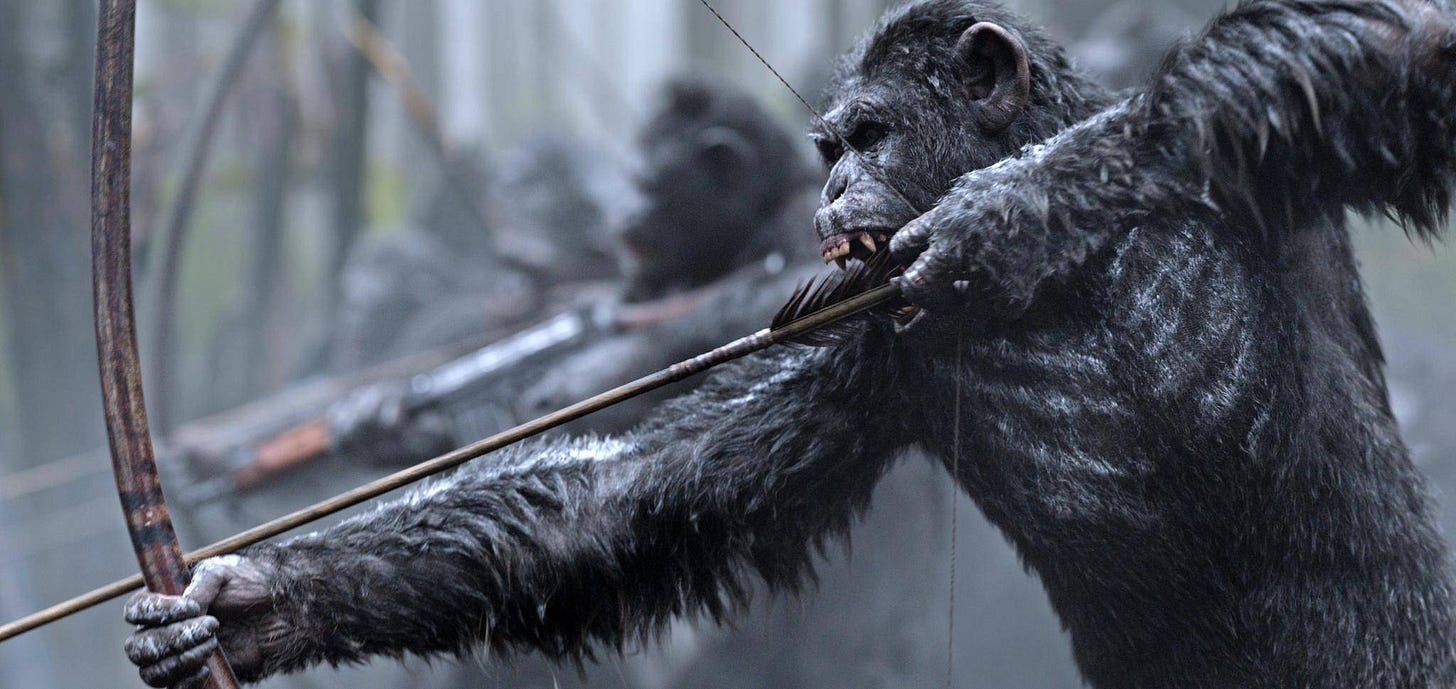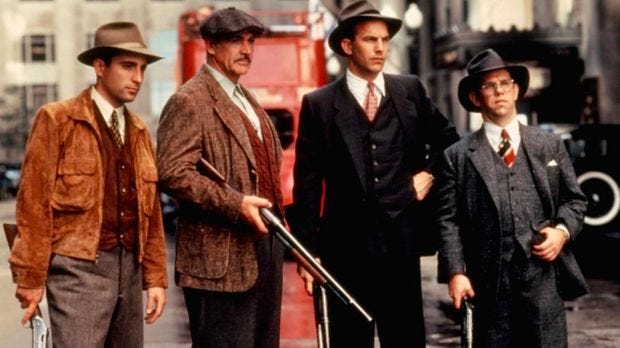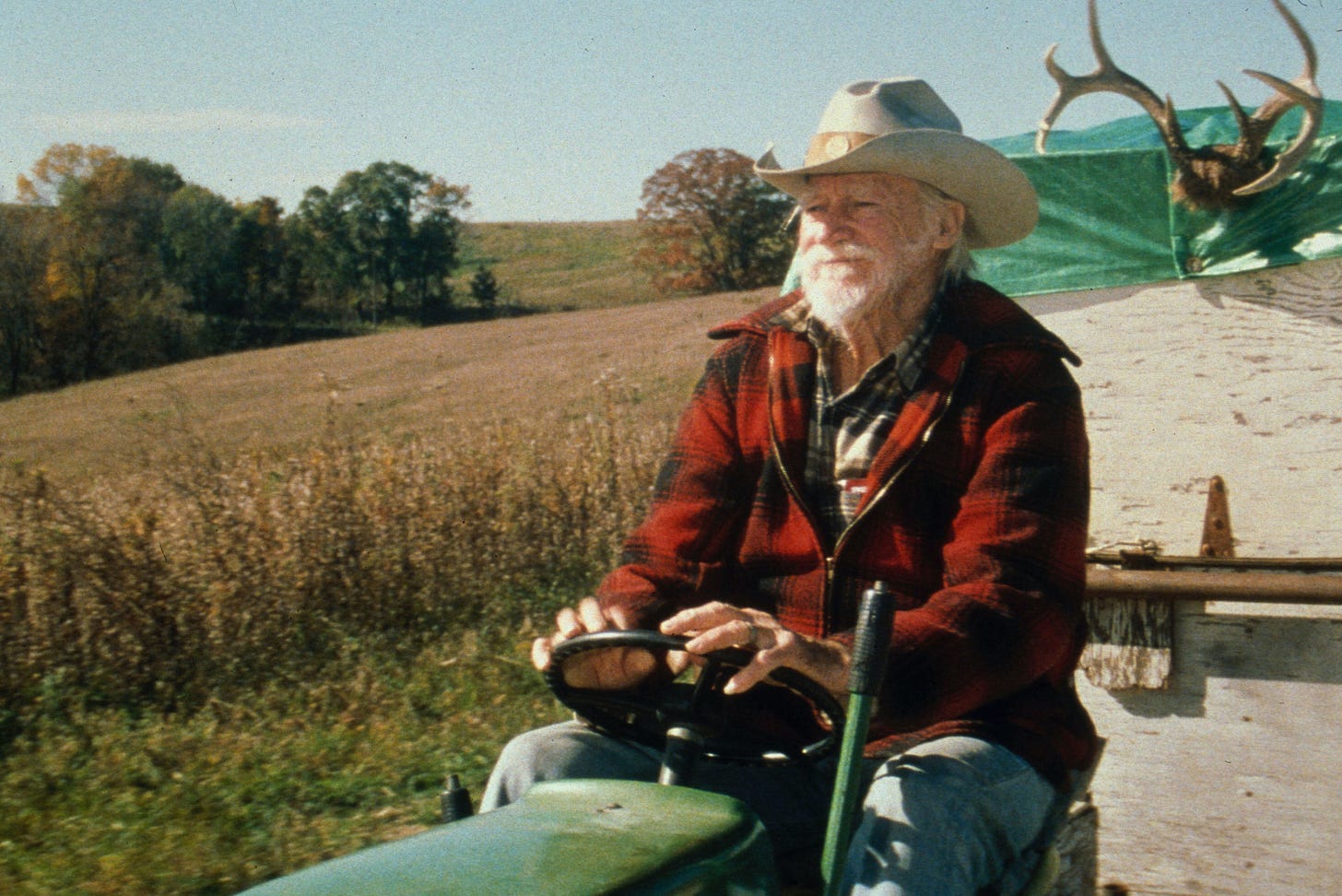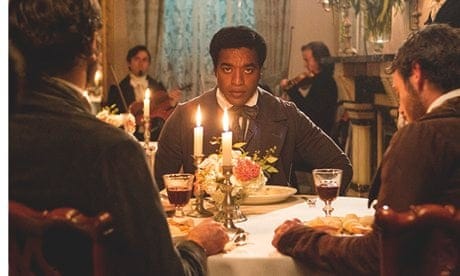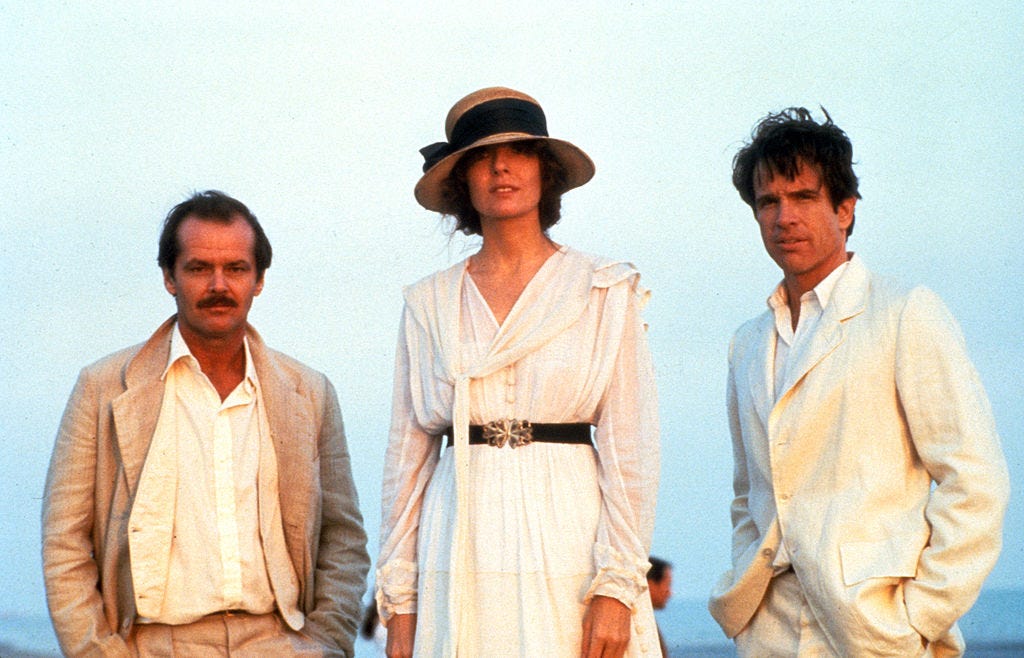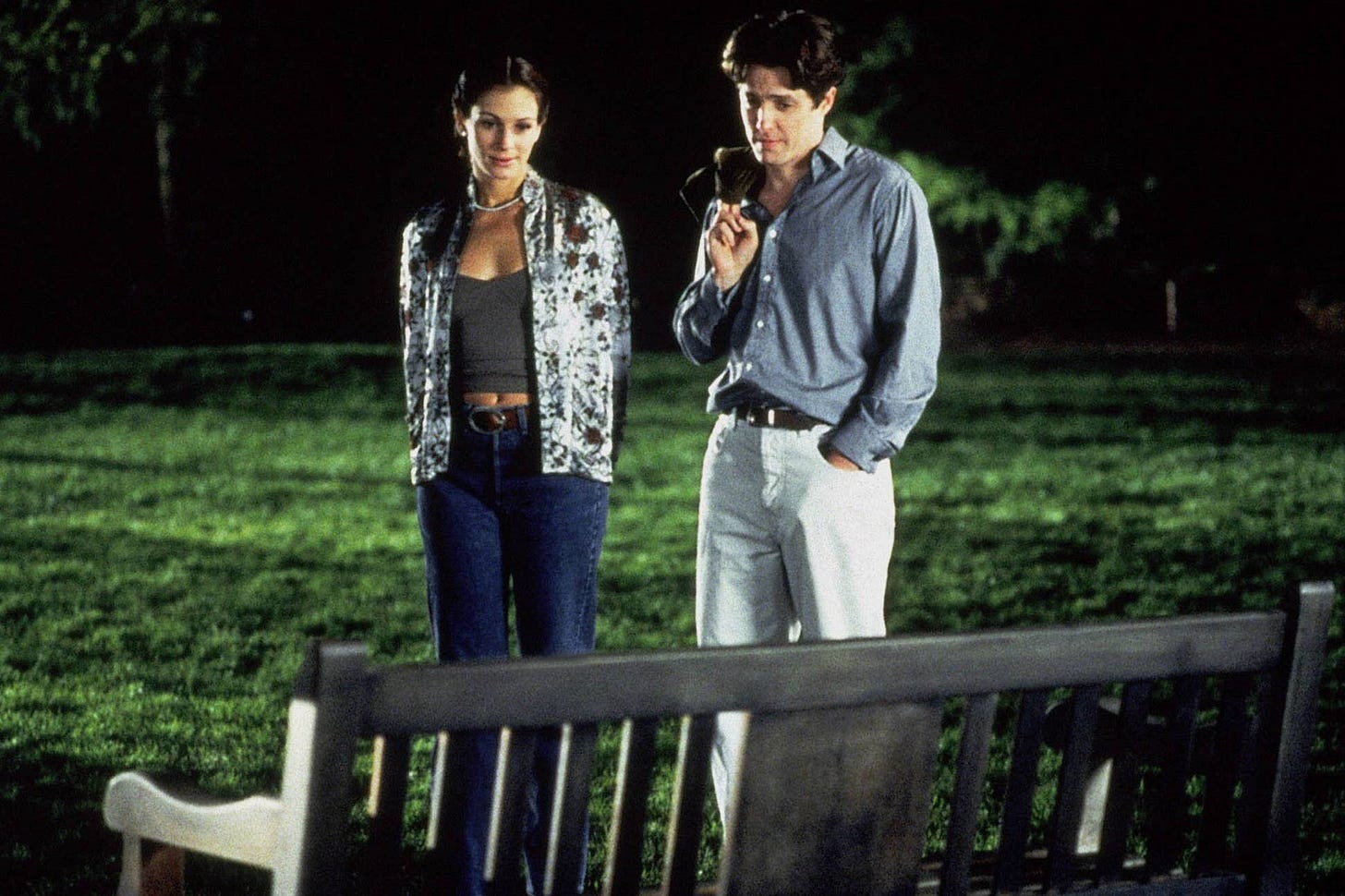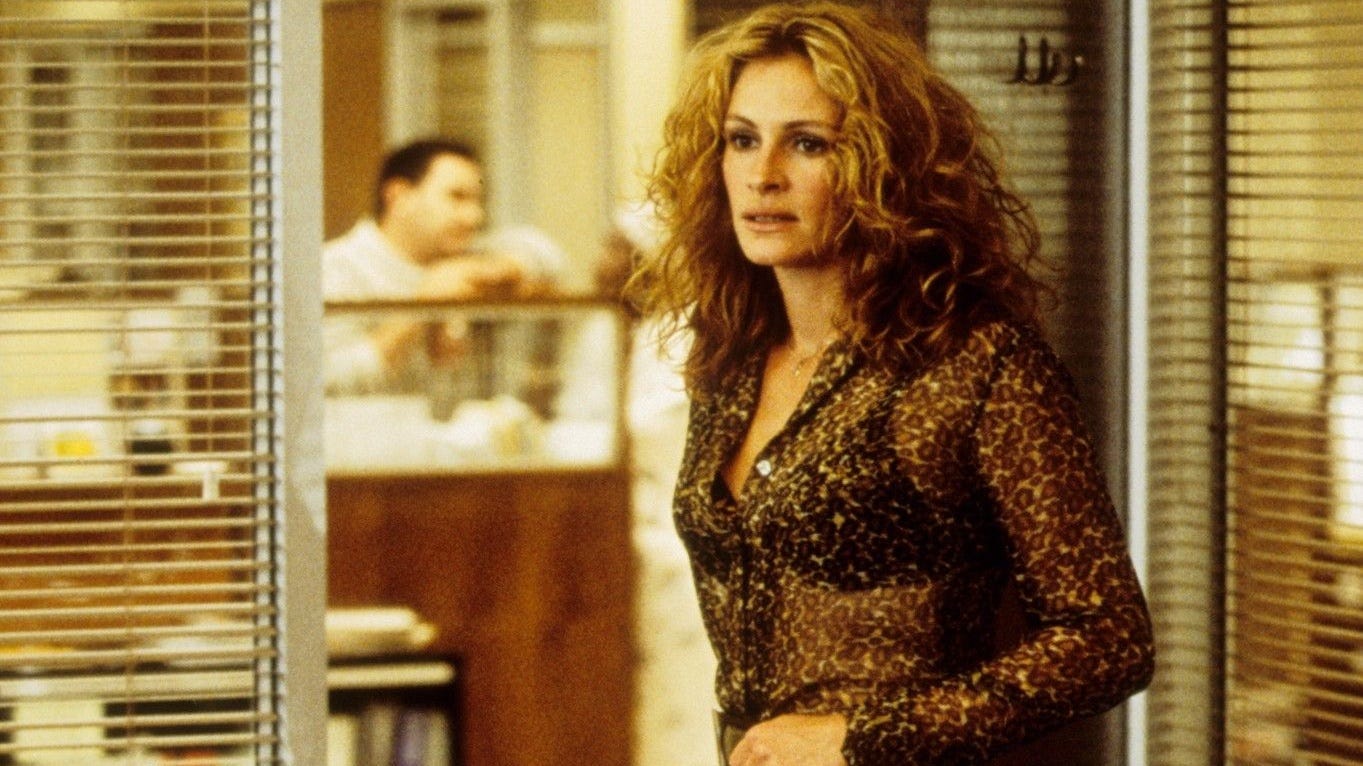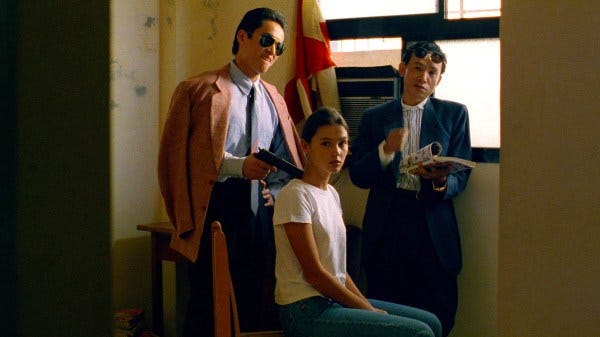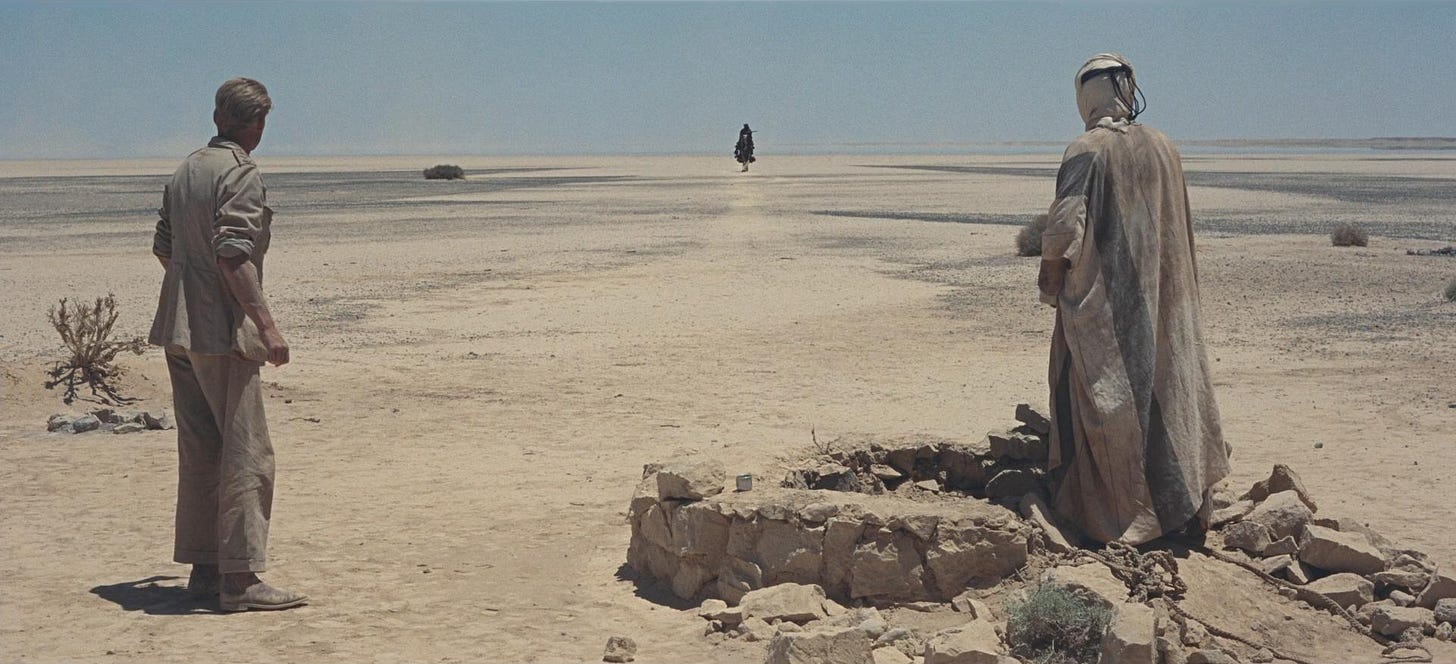The Best Old Movies I Watched for the First Time in 2024
This list has everything: Linklater, Soderbergh, May, Yang...
As always, I love this list for being the most erratic of my Year-Enders. Between catching up on directors’ backlogs ahead of new releases, listening along to various movie podcasts, and watching through the 80s and 90s with my dad, there’s simply no overarching rhyme or reason to my first watches in a given year, which counterintuitively makes them a perfectly anachronistic time capsule for whatever I had going on at the time.
(You can find the entire ranked list of my 2024 first-watches HERE.)
10. Everybody Wants Some!! - dir. Richard Linklater
A perfect spiritual sequel to Dazed and Confused, and just as good at sketching a certain kind of American archetype (collegiate baseball players this time) with taxonomical precision. Linklater knows there’s greater value in simply capturing the true way these bros are instead of polishing them into something they’re not or moralizing about how they should be. There’s no judgment, only honesty: and within that, a joc(k)ular elasticity that sees them swing from carnivorous to sweet in the course of a single night, and from enemies to brothers in the span of a single practice. I didn’t know them, but I know them—and that’s Linklater’s gift.
9. War for the Planet of the Apes - dir. Matt Reeve
Among so many other thrills I got from catching up on Matt Reeve’s Apes movies, it was cool to realize that he tried aping the same Paths of Glory POV-march-through-an-awed-crowd shot with Caesar that he later did with Batman, which speaks to the unlikely but incredible fact that the people making apes blockbusters are aiming as high as Kubrick (who famously made his own kind of ape cinema). How many mainstream genre trilogies do we have that are made with this much care, or vision, or thoughtfulness? Alien, The Dark Knight… and then what? Whether or not War is the best of this trilogy, it’s definitely my favorite: just two-and-a-half hours of gorilla warfare and prison breaks and heartache. Tell me why I mourn more for these apes than for most human characters from the last decade of cinema? It doesn’t matter how many prepositions they add to the titles; I’ll be seated for Beginning of the End of the Reign of the Kingdom of the Planet of the Apes and beyond.
8. The Untouchables - dir. Brian De Palma
One of many 80s and 90s blindspots I worked on correcting with my dad this year, and easily among the best of the bunch. A rip-roaring gangster flick with Morricone on the score, Armani on the threads, De Palma on the split diopter, and Costner on the horse—what’s not to love? It’s also a glorious midwestern that’s more concerned with effect than cause, with a De Niro performance that acts as a skeleton key to Colin Farrell’s performance in The Batman. Just a bounty of bounties.
7. The Straight Story - dir. David Lynch
True to its title, this is a surprisingly straightforward (for Lynch) story about a man who rode a riding mower across state lines to reconcile with his brother. It’s earnest, honest, and sweet—but never saccharine, because of the first two things. It also has an incredibly endearing performance from Richard Farnsworth that made me miss all of my grandpas, here and above. The Badalamenti score is wonderful per usual, and it really is amazing how well this based-on-a-true-story script by someone else fits Lynch’s sensibilities like a glove. A beautiful, beautiful movie that made me cry seemingly without even trying.
6. 12 Years a Slave - dir. Steve McQueen
McQueen’s unsparing American twist on The Good Samaritan only becomes more excruciating the closer each non-Samaritan gets to finding their humanity, never quite grasping enough of it to spare any for their enslaved neighbors. It’s brutal to watch, and yet the director’s steady hand foregrounds the inextinguishable humanity in each tortured soul, easily eclipsing their torturers.
For that and more, it earns the half-star bump of any movie that makes me cry, and does so by taking a tried formula (hard-won redemption/forgiveness) and movingly inverting it (the person asking for forgiveness is the last person who should be). Clear-eyed.
5. Reds - dir. Warren Beatty
After watching Horizon: An American Saga, it was especially impressive to be reminded of just how much you can accomplish with a three-hour runtime—which, in the case of Warren Beatty’s epic drama about legendary journalist John Reed, is just about everything a movie can possibly accomplish. I always love watching a film that makes you feel like like you’re reading a novel, and this is an especially rich text about a man so principled he occasionally forgot to be principled, and the woman just unprincipled enough to forgive him. In sort of splitting the difference between Oppenheimer and Lawrence of Arabia, it finds its own lane with historical specificity and romantic universality. Elaine May remains undefeated, even/especially as a punch-up queen for Beatty’s sprawling script.
4. Notting Hill - dir. Roger Michell
This has always been such an unimpeachable classic in my parents’ eyes that I guess I never felt the need to check it out for myself. Well, what a shame—I could’ve been sharing in their love all along. A rom-com that largely plays out in bookstores and flats, where the two leads spend just as much time not together (and Not Together) as they do hitting it off? A movie for Real Yearners, in other words, so count my pining soul in.
(It’s a testament to Julia Roberts’ megawattage that she’s so easily recognizable as a “star” next to someone as charismatic as Hugh Grant. They’re both, obviously, huge winners here, meaning so are we.)
3. Erin Brockovich - dir. Steven Soderbergh
Back-to-back entries for Julia Roberts, and deservingly so. What to say about Zodiac in a cheetah-print shirt and heels, other than God bless America, and God bless Steven Soderbergh?
2. Mahjong - dir. Edward Yang
The late great Edward Yang topped last year’s list with his opus, Yi Yi, and he nearly retained the belt this year with this comic romance by way of Paul Thomas Anderson—think Punch-Drunk Love or Licorice Pizza, their jokes and unlikely loves playing out within earshot of a darker, more grounded world.
Like Yang’s other movies, Mahjong is almost a work of collage, assembling overlapping stories whose arcs intersect and interact but still point off in their own elliptical directions. By saying so relatively little but gesturing at so much, he inflates the film with profundity, making something greater than the sum of its already terrific parts. He also seems to have the animator’s superpower of arranging the world just for his camera; each composition feels both impossibly perfect and completely unstaged, like the objects and actors just naturally bent into a masterpiece the second Yang walked by. All of this works in harmony to capture the contradictions of his Taiwan: you wouldn’t believe what goes on at the Hard Rock Cafe Taipei, but you can probably imagine how sublime Yang makes it look.
1. Lawrence of Arabia - dir. David Lean
Yes, yes, good, very good, excellent… I’m sorry—did I somehow miss the big worms? Falsely messianic interloper, yes; inevitable churn of empire, check; but—and I was keeping an eye out—not even one single giant worm? Not sure I get the thinking there…
Over in the pros column, I love that Lawrence definitely is England, but he’s also Lawrence; his self-interest is emblematic but also personal, and not in totally congruent ways. I don’t know where my preconception that all movies made before 1970 are simple and trite comes from (probs the hubris of the young), but it’s always such a pleasure to be proven wrong, and even more so in beautiful Super Panavision 70.
Honorable Mentions
Dawn of the Planet of the Apes - dir. Matt Reeve
Apart from a bevy of technical and artistic collaborators working in concert to create some of the most stirring blockbusters this side of Avatar, I think the sneaky secret to these movies’ success is the fact that these apes are cute enough to pluck the secret heartstrings usually reserved for dogs and cuddly pets, but human enough to add a layer of complex emotion to the cuteness. Essentially, they’re perfect empathy machines (literally) created in a lab, and boy do I REALLY care about them.
Crazy Rich Asians - dir. Jon M. Chu
Somehow thought this was a musical (?) all these years, but I don’t feel too bad about it because it basically is, they’re just singing with gossip and dresses and looks. I really liked so much about this, but maybe nothing more than the concept of throwing a party because you have some really sick flowers and they’re about to bloom. And maybe I just haven’t seen enough rom-coms, but it felt low-key innovative to me to start one a year into the relationship, centered around another couple’s wedding where that couple is just amenable and chill and totally content to have the drama of our protagonists’ lives playing out in the background of their story.
Solaris - dir. Steven Soderbergh
Does anyone build tension—dramatic, comedic, romantic—with their camera better than Sodie? Edits that confuse only to later resolve, pans that achingly delay the inevitable, reverse shots that show you everything but what you want to see; the man just Gets It, and we’re so blessed that he’s Given It to us in so many different forms. May he do so forever, even through whatever the future’s answer to the iPhone is.
Before Sunrise - dir. Richard Linklater
A litttttle navel-gazy at times, but boy does it win you over. Not unrelatedly, such a great decision to make Ethan Hawke’s character just a little bit annoying; what feels like a bug at first slowly morphs into the feature that unlocks the whole thing.
The Thing - dir. John Carpenter
Suddenly The Hateful Eight makes a lot more sense. Alien on ice! What more could you want!!
Pulse - dir. Kiyoshi Kurosawa
I wish all horror movies were this patient, or put this much thought into each careful, creepy composition. They’re totally different filmmakers, but Kurosawa’s movie reminded me a bit of his countryman Miyazaki in its spirit logic, which feels dangerous without ever being outright malicious. In a way, that’s almost scarier, and both Cure and Pulse play like abstracted riffs on It Follows’ deadly rules, each using subconscious terrors to target subconscious fears. Here, those are fears of isolation and loneliness—and specifically, the idea that you have to actively fight to fend off isolation, which becomes a tricky catch-22 when isolation itself can sap you of the will to fight. Scary, singular stuff.
Mad Max - dir. George Miller
I mean, sure, yeah, I probably wouldn’t have thumbed this as a likely candidate to spawn one of the greatest action movies to ever rock and roll. But unlikelier things have happened, and even raw, newly-not-a-doctor George Miller had a firm enough grasp on the elemental tools of storytelling to forge something lean and mean and sick, full of screaming metal and scorched leather, true to the same wild spirit he would one day fan into a sandstorm. It’s pure, uncut Aussie—an opera sung by lawless bikes and DIY carnage.
The Birdcage - dir. Mike Nichols
More movies should take their screwball premises this seriously. Come for Robin Williams playing it straight (in a sense); stay for Nichols and May nailing their tone with a laser beam.
Hunger - dir. Steve McQueen
So, so smart in its construction, essentially beginning and ending as a silent film with one extended conversation at its turning point to show us how great the dialogue could’ve been, and to remind us how powerful withholding it can be.
The Heartbreak Kid - dir. Elaine May
It’s the patience that sells this. There are no shortcut jokes, no cheap shocks. Everything that is funny or uncomfortable or profound here is on the other side of a long, drawn-out scene—not to bore us, but to build real, hard-earned tension, both romantic and comedic. The movie is less a series of balloons set to pop, and more one pathetic balloon working desperately to re-puff itself after each new deflation, the trials and tribulations of a man addicted to disappointment.





